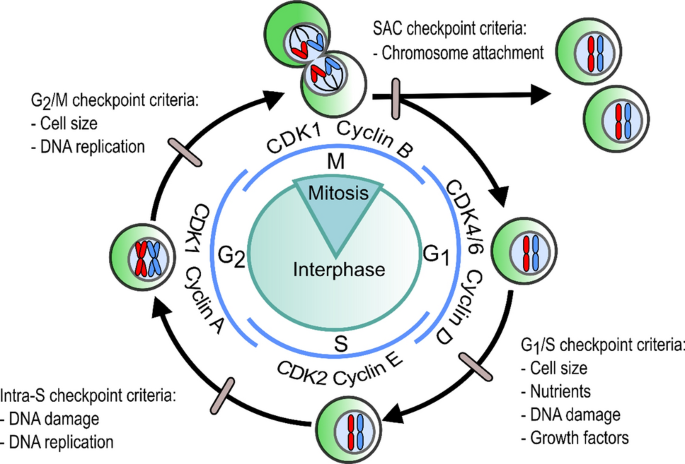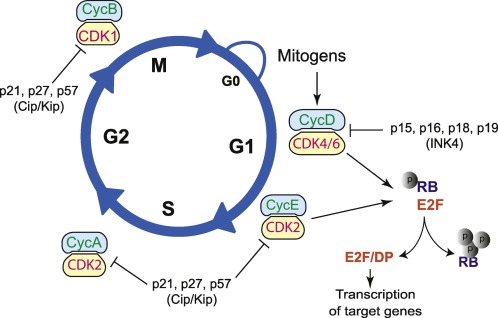-

The Cell Cycle and Its Regulation
The cell cycle is a series of events that occur as a cell grows and divides into two daughter cells. It can be divided into two main stages: interphase and the mitotic phase. Interphase can be further divided into three stages: G1, S, and G2. During interphase, the cell grows and carries out necessary biosynthetic…
-

Prokaryotic DNA Replication
Prokaryotic DNA replication is a tightly regulated and coordinated process in which bacterial cells duplicate their genetic material before cell division. The process is semi-conservative and includes the initiation, elongation, and termination of replication, involving enzymes such as DNA polymerase, primase, and helicase. The replication is initiated by the binding of the replication initiator protein…
-

Cell Cycle (Basic)
I. Introduction II. Interphase A. G1 phase B. S phase C. G2 phase III. Mitotic Phase IV. Conclusion
-

Cell cycle regulatory proteins
I. Introduction II. Cyclin-dependent kinases (CDKs) III. Cyclin-dependent kinase inhibitors (CKIs) IV. Retinoblastoma protein (Rb) V. Tumor protein p53 (p53) VI. Conclusion
-

Eukaryotic cell cycle regulation
The cell cycle is a precisely regulated process essential for cell growth and division. It consists of four distinct phases: G1, S, G2, and mitosis. Each phase plays a crucial role in ensuring accurate cell division and maintaining genomic integrity. The cell cycle is governed by various checkpoints that assess DNA integrity, availability of growth…
-

Centrosomes Structure and Function
Centrosomes are vital organelles in eukaryotic cells that play an essential role in the organization of the cell’s microtubule cytoskeleton and the proper distribution of genetic material during cell division. Composed of two cylindrical centrioles surrounded by pericentriolar material, these organelles act as nucleation sites for the formation of microtubules, which are crucial for cell…
-

Cell Cycle and Its Regulation
The cell cycle is a fundamental process that is essential for the growth, development, and maintenance of all living organisms. It is a series of events that a cell undergoes to replicate and divide into two daughter cells. The cell cycle can be divided into two main stages: interphase and mitosis. Interphase is the period…
-

Mitosis: Cell Division
Mitosis cell division is essential for the growth and repair of an organism. Mitosis involves four main stages: prophase, metaphase, anaphase, and telophase, followed by cytokinesis, the final stage where the cell physically divides into two identical daughter cells. The proper execution of mitosis is critical for the accurate replication and segregation of DNA and…
-

Meiosis: Cell Division
The text explains the process of meiosis, which is a type of cell division that produces reproductive cells or gametes. Meiosis reduces the chromosome number by half and is divided into two rounds of cell division: meiosis I and meiosis II. In meiosis I, the chromosomes pair up with their homologous partner, exchange genetic material…
-

The cytoskeleton
The cytoskeleton, a complex network of protein filaments, serves as the architectural backbone of eukaryotic cells. Comprised of microfilaments, intermediate filaments, and microtubules, it provides structural support, cell shape, and motility. Functionally versatile, the cytoskeleton plays crucial roles in cell division, endocytosis, and exocytosis. Regulated by specific proteins, its dynamic nature underlies various cellular processes.…
Categories
- Anatomy (9)
- Animal Form and Functions (38)
- Animal Physiology (65)
- Biochemistry (33)
- Biophysics (25)
- Biotechnology (52)
- Botany (42)
- Plant morphology (6)
- Plant Physiology (26)
- Cell Biology (107)
- Cell Cycle (14)
- Cell Signaling (21)
- Chemistry (9)
- Developmental Biology (36)
- Fertilization (13)
- Ecology (5)
- Embryology (17)
- Endocrinology (10)
- Environmental biology (3)
- Genetics (59)
- DNA (27)
- Inheritance (13)
- Histology (3)
- Hormone (3)
- Immunology (29)
- life science (76)
- Material science (8)
- Microbiology (18)
- Virus (8)
- Microscopy (18)
- Molecular Biology (113)
- parasitology (6)
- Physics (3)
- Physiology (11)
- Plant biology (26)
- Uncategorized (7)
- Zoology (112)
- Classification (6)
- Invertebrate (7)




